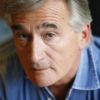Want to know what books Francis Spufford recommends on their reading list? We've researched interviews, social media posts, podcasts, and articles to build a comprehensive list of Francis Spufford's favorite book recommendations of all time.
1

When the British journalist Rachel Polonsky moves to Moscow, she discovers an apartment on Romanov Street that was once home to the Soviet elite. One of the most infamous neighbors was the ruthless apparatchik Vyacheslav Molotov, a henchman for Stalin who was a participant in the collectivizations and the Great Purge—and also an ardent bibliophile. In what was formerly Molotov's apartment, Polonsky uncovers an extensive library and an old magic lantern—two things that lead her on an extraordinary journey throughout Russia and ultimately renew her vision of the country and its people.
more When the British journalist Rachel Polonsky moves to Moscow, she discovers an apartment on Romanov Street that was once home to the Soviet elite. One of the most infamous neighbors was the ruthless apparatchik Vyacheslav Molotov, a henchman for Stalin who was a participant in the collectivizations and the Great Purge—and also an ardent bibliophile. In what was formerly Molotov's apartment, Polonsky uncovers an extensive library and an old magic lantern—two things that lead her on an extraordinary journey throughout Russia and ultimately renew her vision of the country and its people.
In Molotov's Magic Lantern, Polonsky visits the haunted cities and vivid landscapes of the books from Molotov's library: works by Chekhov, Dostoevsky, Pushkin, Akhmatova, and others, some of whom were sent to the Gulag by the very man who collected their books. With exceptional insight and beautiful prose, Polonsky writes about the longings and aspirations of these Russian writers and others in the course of her travels from the Arctic to Siberia and from the forests around Moscow to the vast steppes. A singular homage to Russian history and culture, Molotov's Magic Lantern evokes the spirit of the great artists and the haunted past of a country ravaged by war, famine, and totalitarianism. less 
Francis SpuffordIt is like, if you can imagine it, reading a wonderful series of lamp-lit oil painting interiors, so you feel like you are reading paintings. (Source)

Edward LucasBased on a chance discovery of Molotov’s library, Polonsky takes cultural allusions from Russian literary history and uses them to explain the present. (Source)
2

The definitive biography of the mercurial Soviet leader who succeeded and denounced Stalin. Nikita Khrushchev was one of the most complex and important political figures of the twentieth century. Ruler of the Soviet Union during the first decade after Stalin's death, Khrushchev left a contradictory stamp on his country and on the world. His life and career mirror the Soviet experience: revolution, civil war, famine, collectivization, industrialization, terror, world war, cold war, Stalinism, post-Stalinism. Complicit in terrible Stalinist crimes, Khrushchev nevertheless retained his humanity:... more The definitive biography of the mercurial Soviet leader who succeeded and denounced Stalin. Nikita Khrushchev was one of the most complex and important political figures of the twentieth century. Ruler of the Soviet Union during the first decade after Stalin's death, Khrushchev left a contradictory stamp on his country and on the world. His life and career mirror the Soviet experience: revolution, civil war, famine, collectivization, industrialization, terror, world war, cold war, Stalinism, post-Stalinism. Complicit in terrible Stalinist crimes, Khrushchev nevertheless retained his humanity: his daring attempt to reform communism prepared the ground for its eventual collapse; and his awkward efforts to ease the cold war triggered its most dangerous crises.
This is the first comprehensive biography of Khrushchev and the first of any Soviet leader to reflect the full range of sources that have become available since the USSR collapsed. Combining a page-turning historical narrative with penetrating political and psychological analysis, this book brims with the life and excitement of a man whose story personified his era.
less 
Francis SpuffordKhrushchev started off a miner’s son and had one of those rocket rides in the social stratosphere that could happen once Stalin had got rid of all the old Bolsheviks and needed a completely new political class. He went being from being a semi-literate party member out in the country to the deputy mayor of Moscow in about five years, and he finally ended up as one of Stalin’s inner circle. He... (Source)
3

Vasily Grossman, Robert Chandler | 4.52
A book judged so dangerous in the Soviet Union that not only the manuscript but the ribbons on which it had been typed were confiscated by the state, Life and Fate is an epic tale of World War II and a profound reckoning with the dark forces that dominated the twentieth century.
Interweaving a transfixing account of the battle of Stalingrad with the story of a single middle-class family, the Shaposhnikovs, scattered by fortune from Germany to Siberia, Vasily Grossman fashions an immense, intricately detailed tapestry depicting a time of almost unimaginable horror and even... more A book judged so dangerous in the Soviet Union that not only the manuscript but the ribbons on which it had been typed were confiscated by the state, Life and Fate is an epic tale of World War II and a profound reckoning with the dark forces that dominated the twentieth century.
Interweaving a transfixing account of the battle of Stalingrad with the story of a single middle-class family, the Shaposhnikovs, scattered by fortune from Germany to Siberia, Vasily Grossman fashions an immense, intricately detailed tapestry depicting a time of almost unimaginable horror and even stranger hope.
Life and Fate juxtaposes bedrooms and snipers’ nests, scientific laboratories and the Gulag, taking us deep into the hearts and minds of characters ranging from a boy on his way to the gas chambers to Hitler and Stalin themselves.
This novel of unsparing realism and visionary moral intensity is one of the supreme achievements of modern Russian literature. less 
Antony BeevorLife and Fate…is probably the most important work of fiction about World War II. But, in fact, it is more than just a fiction because it is based on very close reporting from his time with the soldiers. It is a deliberate act of literary homage to Tolstoy as one can see in the title. It is definitely the War and Peace of the 20th century. (Source)

Francis SpuffordIt is about the strange interval of freedom during the Second World War in which the Soviet regime had to trust its people because it couldn’t compel their loyalty. (Source)
4

Arkady Strugatsky, Boris Strugatsky | 4.35
Red Schuhart is a stalker, one of those young rebels who are compelled, in spite of extreme danger, to venture illegally into the Zone to collect the mysterious artifacts that the alien visitors left scattered around. His life is dominated by the place and the thriving black market in the alien products. But when he and his friend Kirill go into the Zone together to pick up a “full empty,” something goes wrong. And the news he gets from his girlfriend upon his return makes it inevitable that he’ll keep going back to the Zone, again and again, until he finds the answer to all his problems. more Red Schuhart is a stalker, one of those young rebels who are compelled, in spite of extreme danger, to venture illegally into the Zone to collect the mysterious artifacts that the alien visitors left scattered around. His life is dominated by the place and the thriving black market in the alien products. But when he and his friend Kirill go into the Zone together to pick up a “full empty,” something goes wrong. And the news he gets from his girlfriend upon his return makes it inevitable that he’ll keep going back to the Zone, again and again, until he finds the answer to all his problems. less 
Francis SpuffordYes, Roadside Picnic is the single greatest work of sci-fi fiction, written by these two scientist brothers. It is what Tarkovsky’s great and weird film Stalker is based on. The story, like a lot of Soviet science fiction, is set safely outside the Soviet Union in a capitalist wasteland, where interesting things can happen that you can talk about! (Source)
5

This masterwork of interpretative history begins with a bold declaration: The Modern Age is the Jewish Age--and we are all, to varying degrees, Jews.
The assertion is, of course, metaphorical. But it underscores Yuri Slezkine's provocative thesis. Not only have Jews adapted better than many other groups to living in the modern world, they have become the premiere symbol and standard of modern life everywhere.
Slezkine argues that the Jews were, in effect, among the world's first free agents. They traditionally belonged to a social and anthropological category known as... more This masterwork of interpretative history begins with a bold declaration: The Modern Age is the Jewish Age--and we are all, to varying degrees, Jews.
The assertion is, of course, metaphorical. But it underscores Yuri Slezkine's provocative thesis. Not only have Jews adapted better than many other groups to living in the modern world, they have become the premiere symbol and standard of modern life everywhere.
Slezkine argues that the Jews were, in effect, among the world's first free agents. They traditionally belonged to a social and anthropological category known as service nomads, an outsider group specializing in the delivery of goods and services. Their role, Slezkine argues, was part of a broader division of human labor between what he calls Mercurians-entrepreneurial minorities--and Apollonians--food-producing majorities.
Since the dawning of the Modern Age, Mercurians have taken center stage. In fact, Slezkine argues, modernity is all about Apollonians becoming Mercurians--urban, mobile, literate, articulate, intellectually intricate, physically fastidious, and occupationally flexible. Since no group has been more adept at Mercurianism than the Jews, he contends, these exemplary ancients are now model moderns.
The book concentrates on the drama of the Russian Jews, including �migr�s and their offspring in America, Palestine, and the Soviet Union. But Slezkine has as much to say about the many faces of modernity--nationalism, socialism, capitalism, and liberalism--as he does about Jewry. Marxism and Freudianism, for example, sprang largely from the Jewish predicament, Slezkine notes, and both Soviet Bolshevism and American liberalism were affected in fundamental ways by the Jewish exodus from the Pale of Settlement.
Rich in its insight, sweeping in its chronology, and fearless in its analysis, this sure-to-be-controversial work is an important contribution not only to Jewish and Russian history but to the history of Europe and America as well. less 
Francis SpuffordSlezkine is an ex-Russian Jewish historian who now works in the United States. And this is a fascinating heterodox piece of 20th-century history which has annoyed some people quite a lot. That’s because he says our sense of 20th-century Jewish history has been distorted by the eventual success of the American Jewish experience as the main metropolitan one – that, he says, was not true for most of... (Source)
Don't have time to read Francis Spufford's favorite books? Read Shortform summaries.
Shortform summaries help you learn 10x faster by:
- Being comprehensive: you learn the most important points in the book
- Cutting out the fluff: you focus your time on what's important to know
- Interactive exercises: apply the book's ideas to your own life with our educators' guidance.



